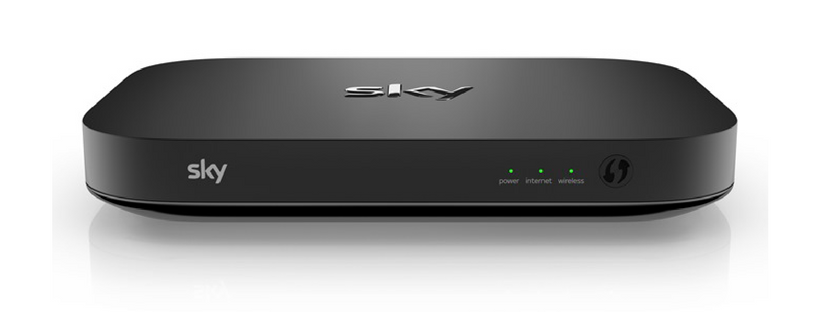Sky broadband vs Virgin Media broadband
By Marc Shoffman | Wednesday, May 19th 2021
It’s the battle of the media giants as Sky goes head-to-head with Virgin Media in the quest for broadband customers.
Virgin Media can’t be beaten for speed but Sky has award-winning customer service. So how can you choose between the two? We run through some of the key differences between Sky and Virgin broadband below.
Broadband speed
When it comes to speed, Sky advertises a maximum average of 59Mbps for its only fibre package, and for standard broadband you'll get 11Mbps. These speeds are, by and large, on a par with other providers operating over the Openreach network, although Sky does fall down slightly on its premium package – BT and EE offer an average of 67Mbps, in comparison.
Virgin’s lowest advertised speed averages 54Mbps. Virgin uses its own cabling network, rather than the Openreach network, so it can offer speeds faster than most other providers. On average, Virgin customers receive speeds very close to those advertised, and in many cases, faster than those advertised.
Virgin Media offers average speeds of 54Mbps, 108Mbps, 213Mbps, 362Mbps, 516Mbps and 1000Gbps, known as Gig1. This puts Virgin way ahead of the other providers, although occasionally in areas where there is a large number of Virgin customers, the top speed may not be available, and the gigabit service is not as widely available as other speeds as yet.
Another important factor to consider is upload speeds. This gives an indication of how long it takes to upload a photo or send any other information to the web. Sky offers upload speeds of 1.5Mbps on its standard broadband and 20Mbps on its 59Mbps fibre deal. These are roughly the same speeds you can expect with any provider on the Openreach network.
Virgin's upload speeds differ slightly and while you may be getting faster download speeds, its uploads aren’t equally good. Its M50 service has upload speeds of 5Mbps, you get 10Mbps with M100, 20Mbps with M200 and to get the maximum of 36Mbps, you have to sign up to M350 at least.
Conclusion
A big tick goes to Virgin on this one as you can get the fastest speeds possible for broadband on this network, although check first exactly what speeds you can get at your postcode, otherwise it may be worth looking at Sky.
-
 No set-up feeSky Broadband Superfast
No set-up feeSky Broadband Superfast- 59Mb average speed +
- Unlimited usage +
- PAYG calls
- No set-up fees (save £19.95)
£23 per monthNo set-up fee£0 one-off cost18 month contract -
 No set-up feeSky Superfast 35
No set-up feeSky Superfast 35- 36Mb average speed +
- Unlimited usage +
- PAYG calls
- No set-up fees (save £19.95)
£30.50 per monthNo set-up fee£0 one-off cost18 month contract -
 £50 Bill CreditVirgin Media M100 Fibre Broadband
£50 Bill CreditVirgin Media M100 Fibre Broadband- 108Mb average speed +
- Unlimited usage +
- No phone line
- Effective Cost Only £23.22pm
- £0 Setup Fee
- You Save £409
£26 per month(usually £44)£50 Bill Credit£0 one-off cost18 month contract -
 £50 Bill CreditVirgin Media M200 Fibre Broadband
£50 Bill CreditVirgin Media M200 Fibre Broadband- 213Mb average speed +
- Unlimited usage +
- No phone line
- Effective Cost Only £27.23pm
- £0 Setup Fee
- You Save £445
£30 per month(usually £50)£50 Bill Credit£0 one-off cost18 month contract
Deals and packages
Sky has two broadband packages. You can get unlimited usage and download speeds averaging 11Mbps on an 18-month contract with Sky Broadband Essential. Alternatively, there is Sky Broadband Superfast, which gives you speeds averaging 59Mbps.
Contract lengths are pretty rigid at 18 months for all Sky broadband deals. Sky also throws in line rental and you can choose to pay extra for one of three Sky Talk phone packages that give you either evening and weekend calls, anytime or international calls.
1bbd.jpg)
In comparison, all Virgin’s packages come with unlimited fibre broadband, starting at M50, offering speeds averaging 54Mbps. That can be doubled to M100 (averaging 108Mbps) or doubled again with M200 (averaging 213Mbps) fibre broadband. It also offers an average of 362Mbps on M300 fibre broadband, 516Mbps on M500 and now 1000Mbps on its Gig1 package.
All Virgin Media packages come with unlimited downloads. You can choose to take out an 18-month contract or be more flexible with a 30-day rolling agreement, although the latter is considerably more expensive.
If you do go with a package with the phone line included you will get inclusive weekend calls to UK landlines, Virgin Mobile numbers, plus inclusive weekend minutes to 0870 numbers. You can upgrade your phone package to include anytime calls and international calls. Alternatively you can choose to go broadband-only with Virgin and not have a phone line at all. Just don't do this to save money – strangely, broadband-only is more expensive than broadband and phone.
Conclusion
No-one likes restrictions and unfortunately Sky seems to lack the flexibility you get with Virgin contracts, coupled with the fast speeds and unlimited downloads available with all its packages.
Compare Sky & Virgin Media deals
Customer service
Both providers do pretty well when it comes to how they treat their customers. Virgin Media performs averagely well, with 85%, based on the latest Ofcom figures. However Sky gets a slightly better 86% which is above the industry average of 85%.
Both also have a fairly high percentage of customers with reason to complain, however. 14% of customers had reason to complain about Virgin Media in 2020, the highest in the industry, while Sky’s corresponding figure was 12%. The industry average for customers with reasons to complain is 12%. However, Sky has the second highest level of satisfaction with how complaints are handled (after EE with 66%), at 62%, compared with only 46% for Virgin, which is considerably below the industry average of 53%.
Virgin Media offers live chat online as well as a messenger text service, or you can phone customer services on 0345 454 1111 seven days a week. Sky customer service is also available seven days a week on 0333 7591 018. Both providers also offer a Community forum where you can find answer questions, and also run social media accounts on Twitter and Facebook where you can get in touch.
When it comes to waiting times to get through to customer services, Virgin Media performs poorly, with customers waiting 4 minutes and 26 seconds on average to get through, while Sky customers fare much better, waiting 2 minutes and 28 seconds on average, just slightly longer than the sector average time of 2 minutes and 10 seconds.
Conclusion
When you are a big broadband provider you are always likely to have higher levels of complaints than others purely because you have a bigger customer base. The important thing is how you deal with those issues, and Sky seems to handle complaints better than Virgin, so gets the tick for this one.
Routers and technology
Whichever one of these you choose, you will be getting some top-notch kit. Unlike other providers, Sky offers everyone the same Sky Broadband Hub router to both standard and fibre customers. Virgin Media also offers the same Hub 3 router to all its customers except those who sign up for the Gig1 service.

All Sky customers get a Sky Broadband Hub with their broadband package. It comes with four ethernet ports, 2.4GHz and 5GHz antennas, and will let you connect up to 64 devices at the same time. Sky Hubs are also designed to save energy and will automatically switch to low power mode when not in use.
Virgin supplies the Virgin Media Hub 3 to all its broadband customers regardless of the speed they choose. The only exception to this is Gig1 customers, who will be provided with the Hub 4, which can comfortably support 1000Mbps. The Hub 3 has four ethernet cables and 2.4GHz and 5GHz wireless channels. It also has five internal antennas that should help to boost your speeds.
Conclusion
Sky and Virgin are neck-and-neck for this one. Virgin Media just nudges ahead with its superior Hub 4, although this is only available to Gig1 customers.
Extras
Sky customers receive a McAfee Internet Security Suite trial for 12 months as well as the Sky Broadband Shield that lets you filter websites and customise your privacy settings into age categories. There is also a neat watershed feature that lets you set age rating restrictions depending on the time of day.
You can also use your internet on the move with the Sky WiFi app. This gives users free and unlimited wi-fi in thousands of popular places across the UK such as cafes and restaurants. It can be used on six registered devices. Many public places will already offer wi-fi by using Cloud hotspots but this gives you an added option where there is less availability.
Virgin Media is pretty similar when it comes to extras. Users get virus protection with F-Secure on up to five devices, although it’s only free for three months, and costs £3 per month thereafter. Parental controls using Web Safe are provided without any charge. There is also Virgin Media WiFi for use at available hotspots on the move, and you can even use it inside London Underground stations.
Conclusion
There is barely anything to differentiate these two on extras. Virgin nudges in front by allowing seven devices with the Connect app to be used at once at its free wi-fi hotspots, compared to six for Sky. But then Sky includes free antivirus software for 12 months against three with Virgin Media.
Overall
Sky and Virgin are very closely matched as broadband providers, with both offering top-quality routers and good extras such as free WiFi and online security packages.
In terms of the broadband packages on offer from each, Sky offers standard and fibre broadband and you have to pay extra for any calls you want to make. Virgin only offers its uniquely fast fibre speeds and includes weekend calls as standard.
Sky just pips Virgin when it comes to the full customer service experience, but when it comes to speed, Virgin cannot be beaten. Its speeds are so far ahead of those offered by almost all other providers that no one else can come close. If it's ridiculously fast speeds you want, then Virgin is the one to go for.